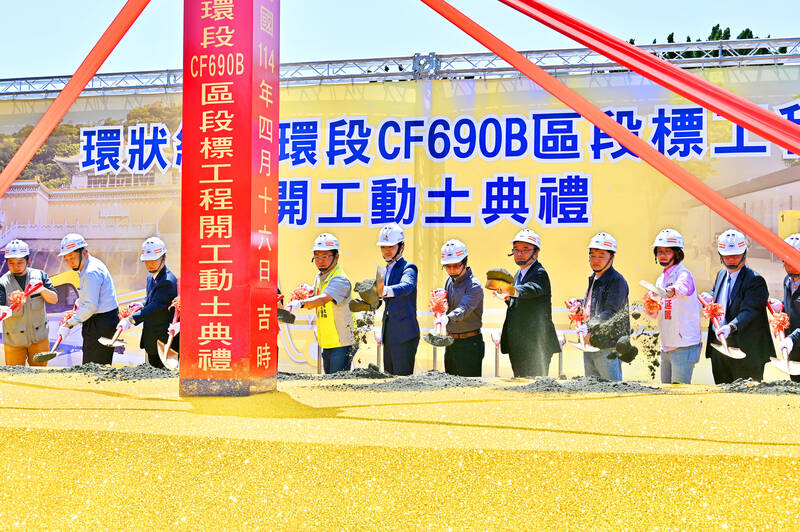The Taipei Department of Rapid Transit Systems should conduct a strict review of the Chinese firm chosen to be the supplier of automatic door systems for the MRT Circular Line, Taipei City Councilor Vincent Chao (趙怡翔) said yesterday.
French company Alstom, which is to supply trains for the line, selected China’s Nanjing Kangni (南京康尼機電) for the door systems, although the company has never worked in Taiwan and has a spotty safety record, Chao said.
Nanjing Kangni is based in Nanjing, China, and its largest shareholder is a Chinese state-owned enterprise. It has multiple records of safety incidents in other locations.

Photo: Tu Chien-jung, Taipei Times
In late 2019 and January 2020, train doors on the New York City subway opened while trains were in motion, forcing 298 trains to stop running.
A similar incident occurred in March 2023 on the Dalian Metro’s fifth line in China.
After the incident in New York, a US senator questioned whether Chinese state-backed capital in the US railway system posed a national security threat, the Democratic Progressive Party councilor said.
The city government should carefully review the investment process and strengthen requirements for contractors’ self-management, he said.
The Taipei City Government can require winning bidders to be responsible for subcontractors, but ultimately bears final oversight responsibilities, lawyer Chin Jui-yun (秦睿昀) said.
According to Article 11 of National Security Act (國家安全法), businesses from China, Hong Kong and Macau cannot work on defense facilities, but the MRT is not classified as such a facility, Chin said.
To address the root issue using legislation would require that the MRT, railways and high-speed rail be classified as part of defense-related infrastructure, he said.
The contract stipulated that the general contractor supplying cars for the new line could not be Chinese, but there was no such regulation for subcontractors, the department’s Electrical and Mechanical Design Division said.
Ultimately the bid must be reviewed by the city government and only after passing testing can production start, although the case has not yet been submitted, it said.

The manufacture of the remaining 28 M1A2T Abrams tanks Taiwan purchased from the US has recently been completed, and they are expected to be delivered within the next one to two months, a source said yesterday. The Ministry of National Defense is arranging cargo ships to transport the tanks to Taiwan as soon as possible, said the source, who is familiar with the matter. The estimated arrival time ranges from late this month to early next month, the source said. The 28 Abrams tanks make up the third and final batch of a total of 108 tanks, valued at about NT$40.5 billion

Two Taiwanese prosecutors were questioned by Chinese security personnel at their hotel during a trip to China’s Henan Province this month, the Mainland Affairs Council (MAC) said yesterday. The officers had personal information on the prosecutors, including “when they were assigned to their posts, their work locations and job titles,” MAC Deputy Minister and spokesman Liang Wen-chieh (梁文傑) said. On top of asking about their agencies and positions, the officers also questioned the prosecutors about the Cross-Strait Joint Crime-Fighting and Judicial Mutual Assistance Agreement, a pact that serves as the framework for Taiwan-China cooperation on combating crime and providing judicial assistance, Liang

A group from the Taiwanese Designers in Australia association yesterday represented Taiwan at the Midsumma Pride March in Melbourne. The march, held in the St. Kilda suburb, is the city’s largest LGBTQIA+ parade and the flagship event of the annual Midsumma Festival. It attracted more than 45,000 spectators who supported the 400 groups and 10,000 marchers that participated this year, the association said. Taiwanese Designers said they organized a team to march for Taiwan this year, joining politicians, government agencies, professionals and community organizations in showing support for LGBTQIA+ people and diverse communities. As the first country in Asia to legalize same-sex

MOTIVES QUESTIONED The PLA considers Xi’s policies toward Taiwan to be driven by personal considerations rather than military assessment, the Epoch Times reports Chinese President Xi Jinping’s (習近平) latest purge of the Chinese People’s Liberation Army (PLA) leadership might have been prompted by the military’s opposition to plans of invading Taiwan, the Epoch Times said. The Chinese military opposes waging war against Taiwan by a large consensus, putting it at odds with Xi’s vision, the Falun Gong-affiliated daily said in a report on Thursday, citing anonymous sources with insight into the PLA’s inner workings. The opposition is not the opinion of a few generals, but a widely shared view among the PLA cadre, the Epoch Times cited them as saying. “Chinese forces know full well that